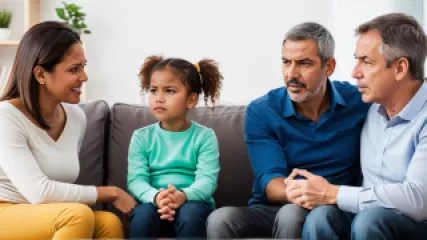Effective Strategies for Improving Family Communication During Conflict
Introduction
Families are complex systems that often face conflicts and disagreements. Navigating family conflict can be challenging, but it is essential for maintaining healthy relationships and fostering effective communication within the family unit. In this research summary, we will explore effective strategies for improving family communication during times of conflict. By implementing these strategies, families can address disagreements in a constructive manner, build stronger relationships, and create a harmonious home environment.
The Importance of Addressing Family Conflict
Family conflict is a natural part of life, but when left unaddressed, it can have detrimental effects on both individuals and the family as a whole. Unresolved conflicts can lead to increased tension, resentment, and even fractured relationships. On the other hand, effectively addressing and resolving conflicts can strengthen family bonds, promote understanding and empathy, and foster personal growth.
Improving family communication during conflict is crucial because it allows family members to express their needs, concerns, and emotions in a safe and supportive environment. It enables individuals to feel heard and validated while encouraging open dialogue and problem-solving. By utilizing effective strategies, families can transform conflict into an opportunity for growth and positive change.
Strategies for Improving Family Communication During Conflict
1. Active Listening: One of the most fundamental aspects of effective communication is active listening. Encourage family members to listen attentively to each other without interrupting or formulating responses prematurely. Active listening involves giving full attention to the speaker, maintaining eye contact, and demonstrating empathy. By truly understanding each other's perspectives, family members can find common ground and work towards resolution.
2. Using "I" Statements: When expressing frustrations or concerns, encourage family members to use "I" statements instead of blaming or accusing language. For example, instead of saying, "You never listen to me," rephrase it as, "I feel unheard when I am interrupted." This approach promotes personal responsibility and reduces defensiveness, creating a more constructive atmosphere for dialogue.
3. Emotional Regulation: Family conflict often triggers strong emotions, which can hinder effective communication. Encourage family members to practice emotional regulation techniques such as deep breathing, taking breaks when necessary, and using positive self-talk. By managing emotions effectively, individuals can engage in discussions with a calm and rational mindset, leading to more productive outcomes.
4. Seeking Professional Help: In some cases, family conflicts may require the assistance of a trained professional. Online therapy for family conflict can provide a safe space for all family members to express their concerns and work towards resolution. Online counseling offers the convenience of accessing therapy from the comfort of home while still receiving expert guidance and support.
5. Establishing Family Meetings: Regular family meetings can serve as a platform for open communication and conflict resolution. Set aside dedicated time each week or month for family members to discuss any issues or concerns. During these meetings, establish ground rules that promote respectful communication and active listening. This practice allows family members to address conflicts proactively and prevent them from escalating.
6. Encouraging Empathy and Understanding: Empathy plays a vital role in resolving conflicts and improving communication within the family. Encourage family members to consider each other's feelings, perspectives, and experiences. By fostering empathy, individuals can develop a deeper understanding of one another and find common ground even in times of disagreement.
Conclusion
Navigating family conflict requires intentional effort and effective communication strategies. By implementing active listening, using "I" statements, practicing emotional regulation, and seeking professional help when needed, families can address conflicts constructively. Establishing family meetings and encouraging empathy and understanding also contribute to creating a harmonious home environment.
Remember that conflict is a natural part of family life, but how we handle it determines its impact on our relationships. By prioritizing open and respectful communication, families can build stronger bonds, resolve conflicts, and create a nurturing environment for personal growth and development. Online therapy for family conflict offers a valuable resource for families in need of additional support. By implementing these strategies, families can navigate conflicts with grace, fostering healthier and more fulfilling relationships.






